Q3 2025
Key Takeaways:
- Developers save an average of 7.3 hours per week thanks to AI tools, yet most companies lack a clear AI strategy to harness this productivity boost.
- Self-learning leads: On-the-job training is the most popular (66%), followed by YouTube (58%).
- Most developers (76%) say AI makes their work more fulfilling, as it allows them to focus on innovation and creative problem-solving.
- 65% of developers worry about falling behind on AI skills, and developers are now spending almost 4 hours per week on upskilling.
- AI and Machine Learning are the learning top priorities for developers in the next 3 months.
When you work side by side with hundreds of companies and thousands of tech professionals, you see change happening in real time. As a nearshore software development partner, we get a front row seat to how AI technology is reshaping industries, transforming workflows, and redefining the skills companies need most. Our vantage point across projects, sectors, and regions gives us a clear view of both the opportunities and the ripple effect of this shift.
That’s why we’ve launched the Dev Barometer, a quarterly look inside the minds of senior software engineers.
In this edition, we heard from 1,129 developers and 50 project managers working across 125 projects in 63 countries, most with 8+ years of experience. By speaking directly with senior professionals embedded in global remote teams, we see how emerging technologies are shaping the field. We’re tracking changes in work models, skill priorities, and how teams adapt over time. Periodically, we’ll share what we’re learning on the ground, so leaders, executives, and tech professionals can make better-informed decisions and prepare for what’s next.
The Q3 2025 edition offers a candid snapshot of where AI adoption stands today: developers are integrating AI deeply into their work, gaining measurable productivity boosts, and prioritizing AI-related skills, yet company strategies and structures are often lagging behind. This gap might just represent an opportunity for companies to pick up the lag and start leveraging this new way of innovation.
Developers Are Saving Nearly A Full Day of Coding Work
Across projects, sectors, and regions, developers are reporting a tangible lift in output. On average, developers are saving 7.3 hours per week by using AI to assist with coding. Nearly half (48%) say that 10–50% of their code is now AI-assisted, and the average share sits at 23.5%. The coding time saved has consequently allowed them to invest on average 4 hours a week in upskilling. This is the case of Jorge García, a senior Ruby developer who transitioned into an AI Engineer role at BairesDev. He makes a point to invest that saved time back into AI, whether it is exploring, creating tools, or figuring out new ways to implement it.
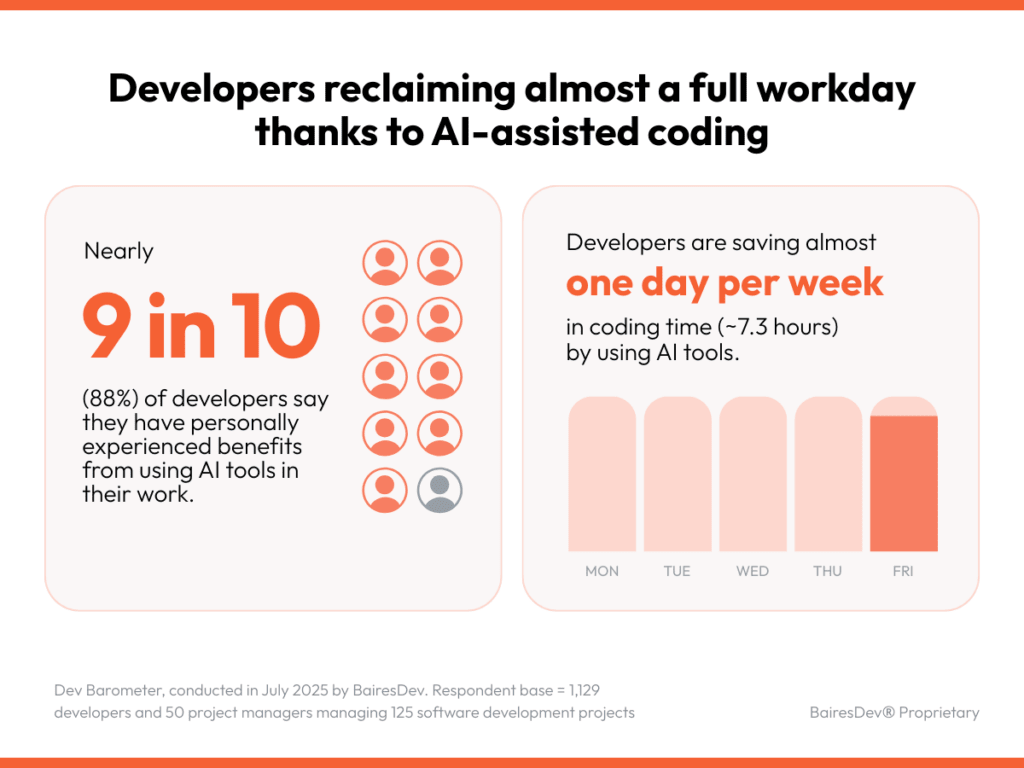
Crucially, 89% of developers report concrete personal benefits, such as faster coding, accelerated learning, and higher productivity. This isn’t an isolated blip. Across the wider industry, adoption is now mainstream, with 51% of professional developers using AI tools daily, and 84% using or planning to use them in their workflow.
When developers gain back the equivalent of a workday each week, much of that time goes into building new capabilities. Many are channeling these hours into learning skills to stay ahead of the curve. Ahmed Somarribas, an integration engineer at BairesDev, considers AI itself a great learning tool. He mentioned that in just a couple of months, it helped him re-skill quickly, going from a junior-level to an almost senior-level developer in JavaScript.
AI and ML Are the Top Learning Priorities in The Next Quarter
The Dev Barometer also reveals that nearly half of developers (44%) named AI and machine learning as their top upskilling priorities for the next three months. This is a reflection of a broader phenomenon. This focus outpaces every other technical area, signaling that AI has become a central driver of career growth. In fact, 65% of developers worry about falling behind on AI skills, fueling their desire to upskill in various ways.
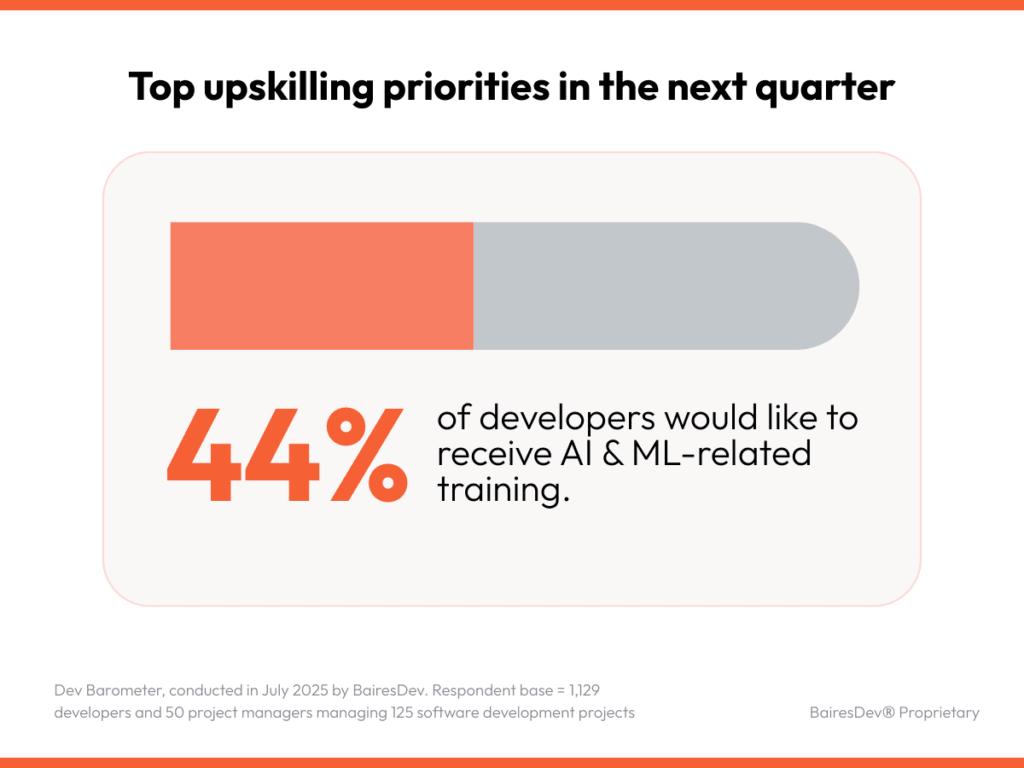
Developers are pursuing new knowledge through a mix of self-directed and informal channels. The most important one is, unsurprisingly, learning on-the-job (66%). However, YouTube tutorials (58%), emerge as a reliable knowledge go-to, and paid courses (48%) rank third. To this point, Melissa Guzman, a Full Stack Developer mentioned she learns through a mix of methods, including paid courses, webinars, and YouTube. She considers the latter especially valuable for quick, targeted learning, such as 10-minute videos in her native language that solve exactly what she needs.
Formal certifications play a smaller role, with only 15% of developers opting for them, suggesting that agility and tailored learning often take precedence over structured programs. In a fast-evolving AI landscape, static certifications may not guarantee real-world proficiency or reflect current industry standards.
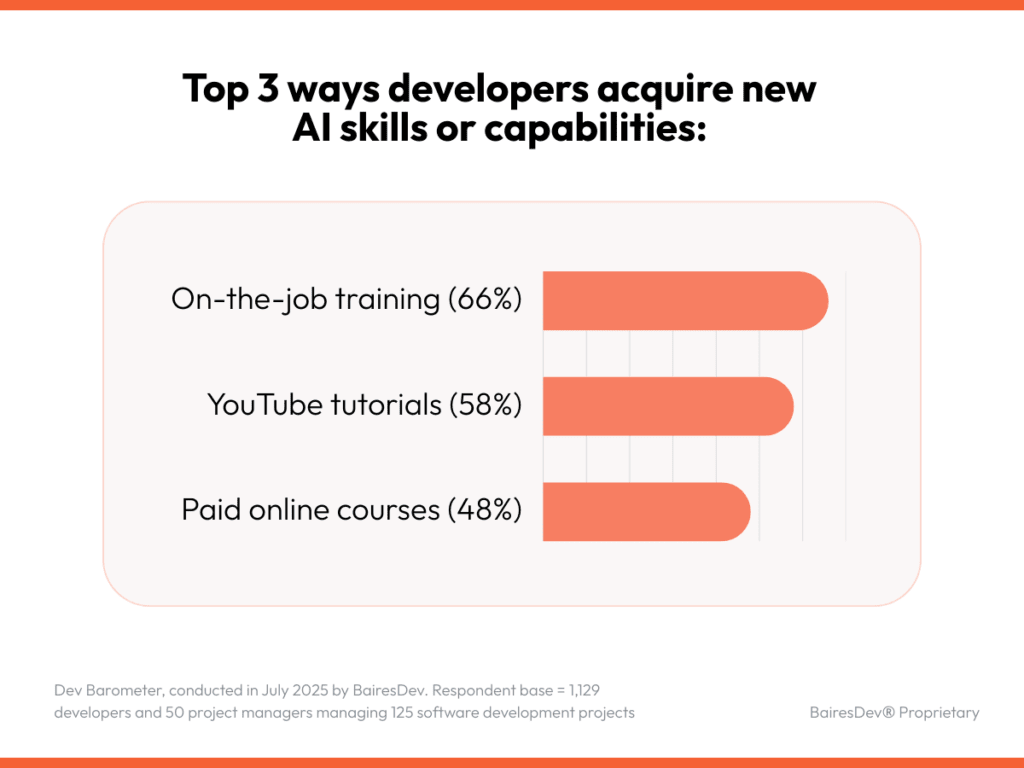
New hybrid roles are emerging at the intersection of coding and AI fluency, from prompt engineers and AI/ML specialists to AI ethicists and data quality engineers. As GitHub CEO Thomas Dohmke put it, “embrace AI or leave the profession,” reflecting a growing industry view that AI literacy is becoming a baseline requirement rather than a niche expertise.
Organizations Are Still Playing Catch-Up With AI
While developers are rapidly adopting AI, most organizations are still struggling to translate that momentum into company-wide gains.
The latest Dev Barometer shows that 64% of software development projects are in early AI stages with an average maturity of 2.2/5. This means most companies have begun pilots and drafted roadmaps, but remain far from enterprise-wide adoption, and a very thin 3.2% have AI embedded at their core. Among large enterprises, AI maturity is only slightly higher, with an average maturity of 2.6 out of 5. This could be caused by AI talent shortages, with 65% of enterprise projects citing a lack of AI/ML specialists.
What’s interesting is that the barriers to AI adoption vary by perspective. While developers point to legacy infrastructure and restrictive policies, project managers highlight unclear ROI and limited resources. The only top challenge both groups agree on is data privacy and security.
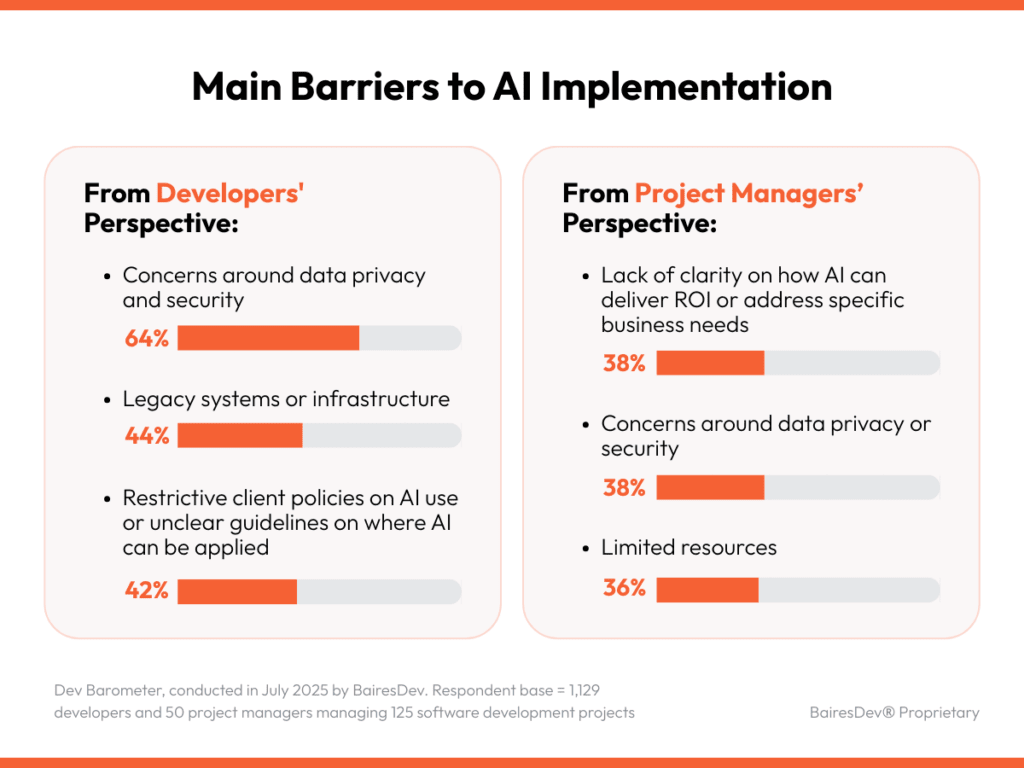
With 87% of developers predicting that generative AI will disrupt business models within the next year, the cost of inaction is high. After GenAI, respondents think AI agents (75%) and private or fine-tuned AI models (55%) will be the most transformative. The Boston Consulting Group’s latest research stresses how AI-first companies are already operating with lean, specialized teams, decentralized tech foundations, and reusable AI workflows, redeploying efficiency gains into growth. Companies without a clear AI strategy, modern data infrastructure, and targeted upskilling programs risk being unable to match this pace and may lose market share and the talent driving AI’s potential.
Remote Work Enables AI Innovation Everywhere
While AI is transforming how developers work, remote work continues to shape who can work in tech. According to the Dev Barometer, 76% of developers agree that remote work has enabled them to pursue a career in the industry. For many, it’s opened doors that were once closed due to geography, cost of living, or personal circumstances.
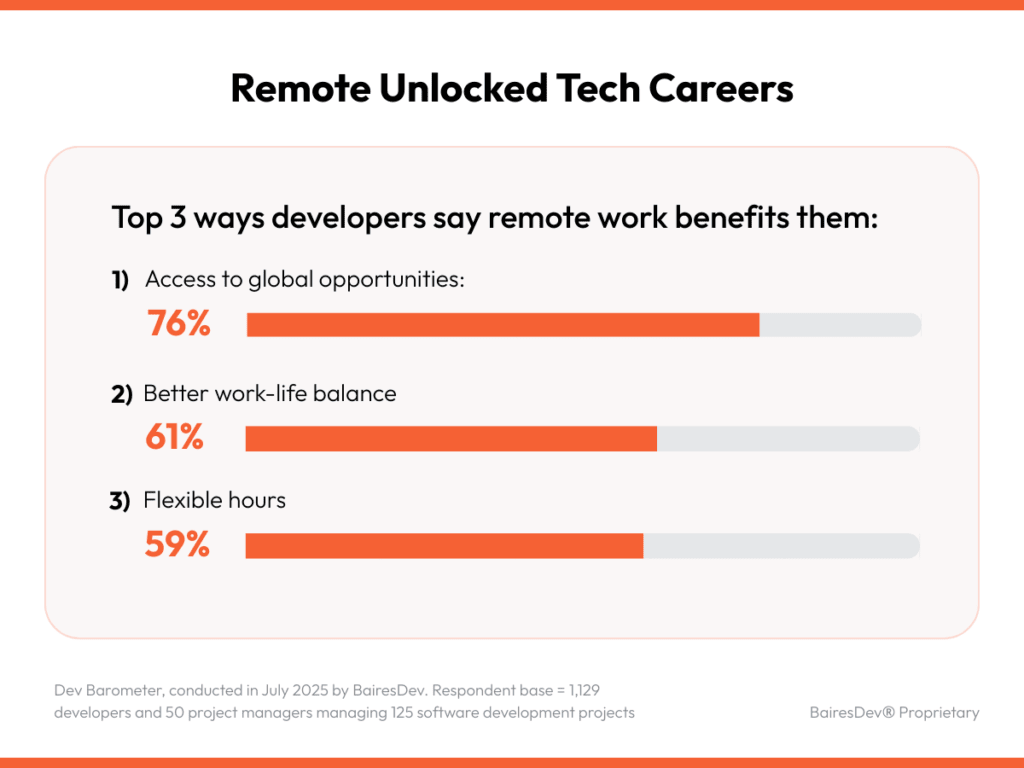
The top-reported benefits go beyond flexibility. Fifty-nine percent cited access to global job opportunities, 48% pointed to better work–life balance, and 46% noted flexible hours. Industry data shows that remote and hybrid models have expanded the available talent pool. It has enabled companies like BairesDev to connect skilled professionals in underrepresented communities with top-tier clients.
BairesDev’s team can attest to the impact and relevance of this work model. Melissa Guzman, a full-stack engineer, mentioned that as someone living in the Dominican Republic, she doesn’t see location as a limitation. “As long as I have internet,” she says, “I can access and contribute to innovation”.
Ronny Cortez, an AI tech lead at BairesDev, introduced an interesting approach that combines remote collaboration with how we can make AI work for the benefit of smaller communities. “The biggest opportunity isn’t just access to AI models, it’s the mindset,” he mentioned, “With open-source and lightweight models, we can bring AI to low-resource communities. A small shift in thinking can lead to major changes in how we implement AI locally.”
For organizations facing talent shortages, especially in AI and specialized software roles, remote work has become a critical lever for inclusion and competitiveness. Continuing to support distributed teams allows companies to reach broader, more diverse talent while giving developers the flexibility they now expect. As AI adoption grows, combining it with inclusive work models could be key to attracting and retaining the people who drive innovation.
Developers Are Embracing AI. Can Organizations Keep Up?
The Q3 2025 Dev Barometer reveals a rising divide. Developers are embracing AI and expanding their skills, while many organizations remain in early adoption stages. Productivity gains, self-driven upskilling, and inclusive remote work models show what’s possible. Companies that prioritize a clear AI strategy, modern infrastructure, and upskilling initiatives are set to thrive and stay ahead.
To keep pace with the evolution, keep an eye on what’s ahead in the next quarterly Dev Barometer edition. Want the full picture? Download the Executive Summary or access the complete dataset with all survey results.






